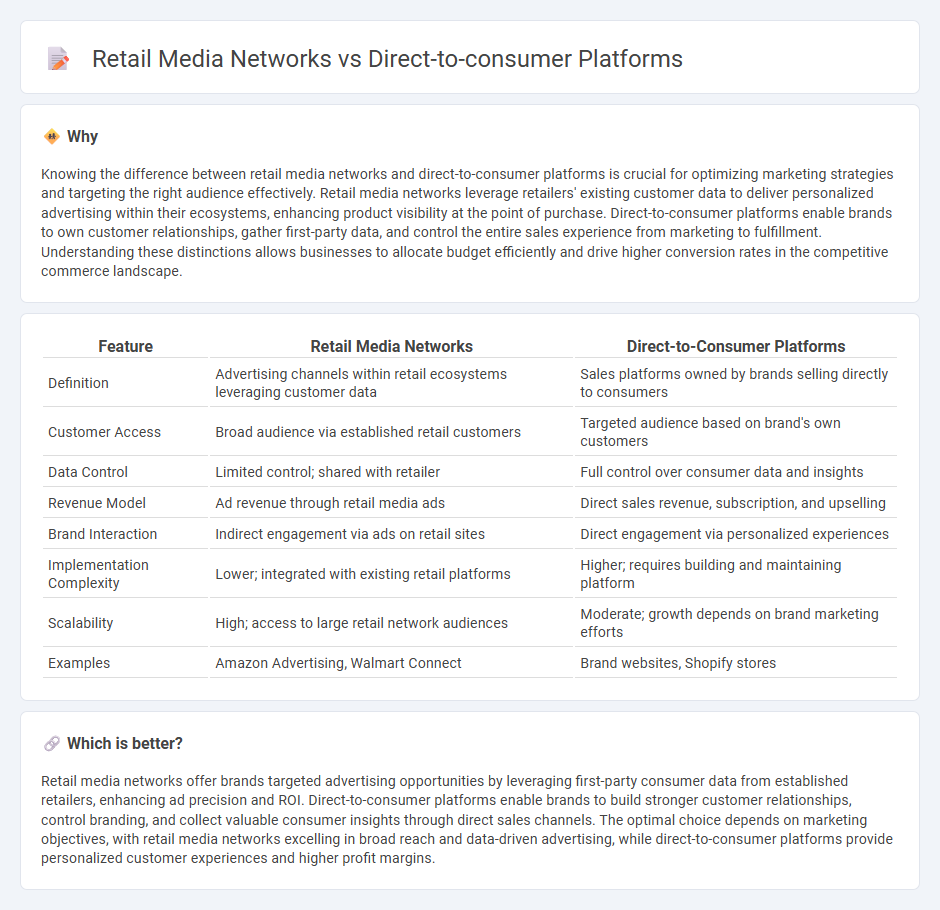
Retail media networks leverage the extensive customer data and shopping environments of established retailers to deliver targeted advertising, enhancing purchase intent and brand visibility at the point of sale. Direct-to-consumer (DTC) platforms enable brands to build personalized customer relationships, gather first-party data, and control their branding and sales channels without intermediaries. Explore how these strategies are reshaping the future of commerce and consumer engagement.
Why it is important
Knowing the difference between retail media networks and direct-to-consumer platforms is crucial for optimizing marketing strategies and targeting the right audience effectively. Retail media networks leverage retailers' existing customer data to deliver personalized advertising within their ecosystems, enhancing product visibility at the point of purchase. Direct-to-consumer platforms enable brands to own customer relationships, gather first-party data, and control the entire sales experience from marketing to fulfillment. Understanding these distinctions allows businesses to allocate budget efficiently and drive higher conversion rates in the competitive commerce landscape.
Comparison Table
| Feature | Retail Media Networks | Direct-to-Consumer Platforms |
|---|---|---|
| Definition | Advertising channels within retail ecosystems leveraging customer data | Sales platforms owned by brands selling directly to consumers |
| Customer Access | Broad audience via established retail customers | Targeted audience based on brand's own customers |
| Data Control | Limited control; shared with retailer | Full control over consumer data and insights |
| Revenue Model | Ad revenue through retail media ads | Direct sales revenue, subscription, and upselling |
| Brand Interaction | Indirect engagement via ads on retail sites | Direct engagement via personalized experiences |
| Implementation Complexity | Lower; integrated with existing retail platforms | Higher; requires building and maintaining platform |
| Scalability | High; access to large retail network audiences | Moderate; growth depends on brand marketing efforts |
| Examples | Amazon Advertising, Walmart Connect | Brand websites, Shopify stores |
Which is better?
Retail media networks offer brands targeted advertising opportunities by leveraging first-party consumer data from established retailers, enhancing ad precision and ROI. Direct-to-consumer platforms enable brands to build stronger customer relationships, control branding, and collect valuable consumer insights through direct sales channels. The optimal choice depends on marketing objectives, with retail media networks excelling in broad reach and data-driven advertising, while direct-to-consumer platforms provide personalized customer experiences and higher profit margins.
Connection
Retail media networks leverage direct-to-consumer platforms by utilizing first-party customer data to deliver targeted advertising within e-commerce environments, boosting conversion rates and customer engagement. Direct-to-consumer platforms provide retailers with granular insights into consumer behavior and preferences, enabling retail media networks to optimize ad personalization and drive sales growth. The integration of these two channels creates a seamless ecosystem for brands to enhance customer experience and maximize marketing ROI.
Key Terms
First-Party Data
Direct-to-consumer platforms leverage first-party data by collecting customer information directly through brand-owned channels, resulting in highly personalized marketing and improved customer engagement. Retail media networks utilize aggregated first-party data from multiple retail partners to offer targeted advertising and enhance campaign effectiveness across a broader audience. Explore how these data-driven strategies redefine advertising in the digital landscape.
Customer Acquisition Cost
Direct-to-consumer platforms typically offer lower Customer Acquisition Costs (CAC) due to targeted marketing strategies and direct consumer engagement without intermediaries. Retail Media Networks leverage large retailer data and advertising ecosystems, often resulting in higher CAC but improved precision in reaching purchasing audiences. Explore detailed comparisons to optimize your marketing investment and reduce CAC effectively.
Channel Control
Direct-to-consumer (DTC) platforms offer brands full channel control by enabling direct customer interactions, first-party data collection, and personalized marketing strategies. Retail media networks, while leveraging retail partner audiences and data, provide less direct control over the customer journey and often involve shared advertising space and rules set by the retailer. Explore how channel control impacts marketing effectiveness and customer engagement to optimize your brand strategy.
Source and External Links
DTC marketplace: Your direct to consumer strategy - A direct-to-consumer (DTC) marketplace is a digital platform where brands sell directly to consumers, cutting out intermediaries and enabling manufacturers to control the entire customer journey from production to sale, which has grown significantly worldwide since the late 2000s.
Direct-to-consumer - DTC is a business model where brands sell products directly to customers bypassing third-party retailers, usually selling online but sometimes with physical stores, with top brands like Allbirds and Warby Parker using this model, which grew out of early internet retailing.
D2C Commerce Orchestration Platform - Direct-to-consumer platforms enable brands to sell directly online with access to customer data and full control over branding and pricing, typically through specialized commerce platforms that differ from broader B2C systems by focusing on a single direct sales channel.
 dowidth.com
dowidth.com